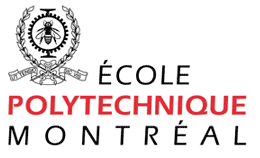Prof D.C. Boffito, Prof S. Poncet
No more applications being accepted
Funded PhD Project (Students Worldwide)
About the Project
Background
Canada averaged 63.1 deaths related to respiratory diseases per 100 000 inhabitants between 2009 and 2011. A successful company based in Québec manufactures an acoustic device that promotes bronchial drainage by low frequency sound waves. The therapy is much gentler than the traditional "clapping" method (frequency in the 20-67 Hz range). The company mandated a research work that takes into consideration several aspects involved in mucous clearance under the action of their device. This project relies upon a multidisciplinary team involving Prof. Boffito (Polytechnique Montréal, Chemical Engineering), Prof. Poncet and Prof. Micheau (University of Sherbrooke, Mechanical Engineering) and consists of both experimental work and numerical modelling.
Description of the positions
Start Date: January 2020 or May 2020
Project 1 (Montréal based, PhD in Chemical Engineering)
Objective: To identify the mucus release mechanisms under the action of the device and optimal conditions.
Test of the device at different frequencies, amplitudes and NaCl concentrations; characterization of the artificial mucous thermophysical and rheological properties, slip/peel tests after the vibrational experiments; design of a predictive rheological model. Objective: identify the mechanism of mucous clearance.
Project 2 (Sherbrooke based, PhD in Mechanical Engineering)
Objective: To build a chest vibrational map and a predictive clearance model under the action of the device.
Mechanical characterization of the device, numerical modelling of geometrical details of the human torso (Comsol), determine numerically the acoustic waves penetration depth and build a chest vibration map to visualize vibration distribution and mucous displacement in the lungs at different operating conditions.
Qualifications
Project 1: The required background is a Master of Science (MSc or equivalent) in Chemical Engineering or Mechanical Engineering or Engineering Physics. Excellent experimental skills are a must. Previous experience with rheological characterization is an important asset.
Project 2: The required background is a Master of Science (MSc or equivalent) in Mechanical Engineering. Previous experience with COMSOL modelling is a requirement.
The direct passage from the bachelor’s to PhD may be considered for Canadian students.
Excellent communication skills in technical English (both oral and written) are essential for all positions. The selection process will be made on the basis of academic merit, language skills and publication record. The applicants must be strongly motivated for graduate studies and be able to work independently towards the objectives of the project.
Applications should be sent by email to Prof. D.C. Boffito ([Email Address Removed]), Prof. Sebastien Poncet ([Email Address Removed]) and Prof. P. Micheau ([Email Address Removed]) with “PhD acoustics” as an object of the email.
Deadline: 2019, August 31st
Incomplete or non-conform applications will not be considered.
About the research teams
The selected candidates will develop research skills in an multidisciplinary environment and will work with chemical and mechanical engineers, chemists and biochemists. They will be supervised by three professors with complementary expertise. This program is strategic for the industrial partner, but also for the scientific community and the government institutions. It includes both fundamental innovative research aspects and a concrete industrial application. The successful candidates will benefit also from the expertise and resources of the three different research teams, i.e. the EPIC (Engineering Process Intensification and Catalysis) lab (Prof. Boffito), the LMFTEUS laboratory (lmfteus.wordpress.com) located at the faculty of engineering of UdeS and the GAUS (Groupe d’Acoustique de l’Université de Sherbrooke).
https://www.polymtl.ca/expertises/en/boffito-daria-c
https://www.usherbrooke.ca/gmecanique/departement/corps-professoral/sebastien-poncet/
https://www.usherbrooke.ca/gmecanique/departement/corps-professoral/philippe-micheau/

 Continue with Facebook
Continue with Facebook

